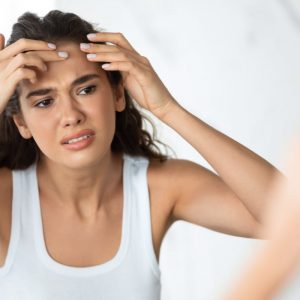Start Your Acne Consultation
Complete a quick and easy questionnaire and one of our prescribers will make sure this treatment is right for you.

Treatments












Related Medication
Frequently Asked Questions
Have a question? We're here to help
What is acne?
Acne is a common skin condition that occurs when hair follicles become blocked with oil and dead skin cells, leading to spots, blackheads, and whiteheads. It most often appears on the face, back, and chest. Acne can affect people of all ages, though it’s most common in teenagers due to hormonal changes.
What causes acne?
Acne develops when excess sebum (oil) and dead skin clog pores, allowing bacteria such as Cutibacterium acnes to thrive. Hormonal fluctuations, stress, and certain medications can also trigger or worsen breakouts. Factors like oily cosmetics and friction from clothing can contribute too.
What are the symptoms of acne?
The main symptoms include whiteheads, blackheads, pimples, and cysts that can appear on the face, neck, chest, shoulders, or back. In more severe cases, acne can cause inflammation, pain, and scarring. The severity and type of spots vary from person to person.
What are the different types of acne?
Acne can be classified into non-inflammatory (blackheads and whiteheads) and inflammatory types (papules, pustules, nodules, and cysts). Hormonal acne tends to appear around the chin and jawline, while bacterial acne can cause red, inflamed spots. Understanding the type of acne helps guide the right treatment.
What treatments are available for acne?
There are several effective acne treatments, including topical gels and creams like Duac Gel, Acnecide Gel, and Finacea, as well as oral antibiotics such as Doxycycline or Lymecycline. These work by reducing bacteria, inflammation, and oil production. Consistent use is key, and results can take a few weeks to appear.
How do acne treatments work?
Most acne treatments aim to target one or more causes of acne – excess oil, bacteria, and clogged pores. Topical treatments like Azelaic Acid (found in Finacea or Skinoren) help clear blocked pores and reduce redness, while antibiotic options such as Doxycycline tackle bacterial infection. Combining treatments is often the most effective approach.
How to tell if acne is hormonal or bacterial?
Hormonal acne often appears around the lower face and jawline and can worsen around your menstrual cycle. It tends to involve deep, painful cysts rather than surface spots. On the other hand, bacterial acne usually presents as inflamed, pus-filled spots that respond well to antibiotic treatments.
What causes severe acne?
Severe acne can be caused by a combination of genetics, hormonal changes, and overactive oil glands. When pores become deeply blocked and infected, cysts and nodules can form beneath the skin. Without treatment, severe acne can lead to long-term scarring and emotional distress.
What triggers bacterial acne?
Bacterial acne is mainly caused by an overgrowth of acne-causing bacteria in blocked pores. Triggers include excess oil production, poor skin hygiene, and using heavy or greasy cosmetics. Treatments such as Duac Gel, Zineryt Solution, or oral antibiotics can help control bacteria and reduce inflammation.
What worsens acne?
Acne can worsen with hormonal changes, stress, certain medications, or using skincare products that clog pores. Picking or squeezing spots also spreads bacteria and increases the risk of scarring. Keeping to a gentle, consistent skincare routine helps manage breakouts more effectively.
How long does acne last?
Acne can last for several years, often improving with age or hormonal balance. Some people continue to experience breakouts into adulthood, especially if their acne is hormonal. Effective treatments can significantly reduce symptoms and prevent future flare-ups.
How do I permanently get rid of acne?
While there’s no instant cure, acne can be managed effectively with the right long-term treatment plan. Using prescribed medications such as Differin Gel, Epiduo Gel, or antibiotic capsules helps control outbreaks and prevent scarring. Consistency and patience are key to achieving clear skin.
Can acne go away on its own?
Mild acne may clear up without treatment, especially after puberty when hormone levels stabilise. However, moderate to severe acne usually requires medical treatment to prevent scarring and long-term damage. Early intervention can make a big difference to skin health.
Will acne ever fully go away?
For many people, acne improves or disappears with age or consistent treatment. However, it can occasionally persist into adulthood, particularly if triggered by hormones or certain lifestyle factors. Ongoing management with suitable skincare and medication can help maintain clear skin.
When should I see a doctor about acne?
You should seek medical advice if your acne is painful, leaving scars, or affecting your confidence. Persistent or severe acne often needs prescription treatments like antibiotics or retinoid-based gels. A healthcare professional can recommend the best plan for your skin type and severity.
























